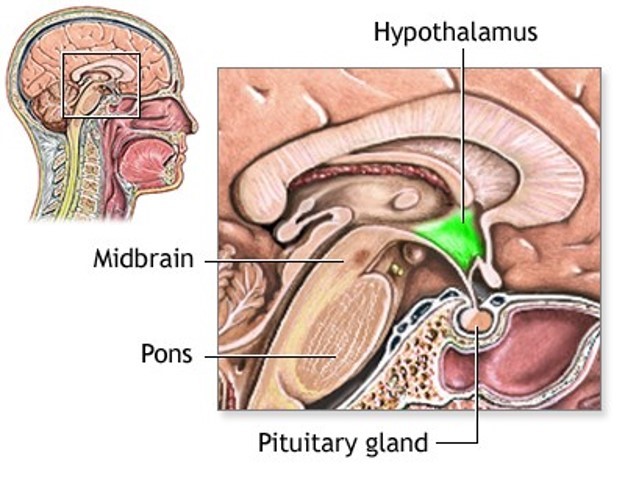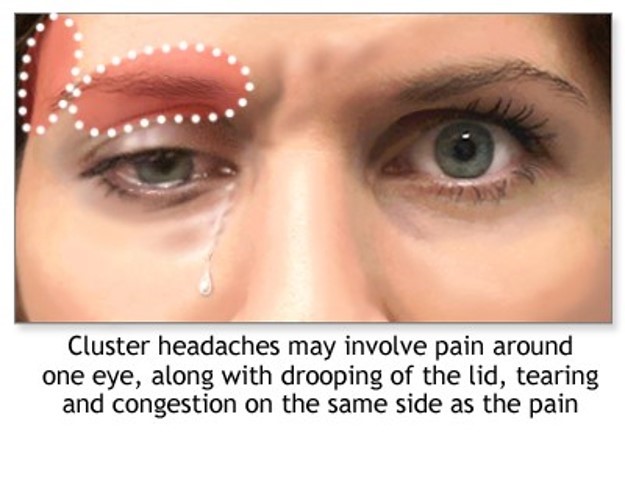Cluster headache
Contents
When to Contact a Medical Professional
A cluster headache is a type of headache. It is one-sided head pain that may involve tearing of the eyes and a stuffy nose. Attacks occur regularly for 1 week to 1 year. The attacks are separated by pain-free periods that last at least 1 month or longer.
Cluster headaches may be confused with other common types of headaches such as migraines, sinus headache, and tension headache.
Causes
Scientists do not know exactly what causes cluster headaches. They seem to be related to the body's sudden release of histamine (chemical in the body released during an allergy response) or serotonin (chemical made by nerve cells). A problem in a small area at the base of the brain called the hypothalamus may be involved.
More men than women are affected. The headache can occur at any age, but are most common in adolescence and middle age. They tend to run in families.

Cluster headaches may be triggered by:
-
Alcohol and cigarette smoking
-
High altitudes (trekking, air travel)
-
Bright light (including sunlight)
-
Exertion (physical activity)
-
Heat (hot weather, hot baths)
-
Foods high in nitrites (such as bacon and preserved meats)
-
Certain medicines
-
Cocaine
Symptoms
A cluster headache begins as a severe, sudden headache. The headache commonly strikes 2 to 3 hours after you fall asleep. But it can also occur when you are awake. The headache tends to happen daily at the same time of day. Attacks can last for months. Or they can alternate with periods without headaches (episodic). Or they can go on for a year or more without stopping (chronic).
Cluster headache pain is usually:
-
Burning, sharp, or steady
-
Felt on one side of the face from neck to temple, even involving the eye
-
At its worst within 5 to 10 minutes, with strongest pain lasting 30 minutes to 2 hours

When the eye and nose on the same side as the head pain is affected, symptoms can include:
-
Swelling under or around the eye (may affect both eyes)
-
Excessive tearing
-
Red eye
-
Runny nose or stuffy nose on the same side as the head pain
-
Red, flushed face
Exams and Tests
Your health care provider can diagnose this type of headache by performing a physical exam and asking about your symptoms and medical history.
If a physical exam is done during an attack, the exam will usually reveal Horner syndrome (one-sided eyelid drooping or a small pupil). These symptoms will not be present at other times. No other nervous system (neurologic) changes will be seen.
Tests, such as an MRI of the head, may be needed to rule out other causes of the headaches.
Treatment
Treatment for cluster headaches involves:
-
Medicines to treat the pain when it happens
-
Medicines to prevent the headaches
TREATING CLUSTER HEADACHES WHEN THEY OCCUR
Your doctor may recommend the following treatments for when the headaches occurs:
-
Triptans, such as sumatriptan (Imitrex)
-
Anti-inflammatory (steroid) medicines such as prednisone -- starting with a high dose, then slowly decreasing it over 2 to 3 weeks
-
Breathing in 100% (pure) oxygen
-
Injections of dihydroergotamine (DHE), which can stop cluster attacks within 5 minutes (Warning: this drug can be dangerous if taken with sumatriptan)
You may need more than one of these treatments to control your headache. Your doctor may have you try several medicines before deciding which works best for you.
Pain medicines and narcotics do not usually relieve cluster headache pain, because they take too long to work.
PREVENTING CLUSTER HEADACHES
Avoid smoking, alcohol use, certain foods, and other things that trigger your headaches. A headache diary can help you identify your headache triggers. When you get a headache, write down the following:
-
Day and time the pain began
-
What you ate and drank over the past 24 hours
-
How much you slept
-
What you were doing and where you were right before the pain started
-
How long the headache lasted and what made it stop
Review your diary with your doctor to identify triggers or a pattern to your headaches. This can help you and your doctor create a treatment plan. Knowing your triggers can help you avoid them.
The headaches may go away on their own. Or you may need treatment to prevent them. The following medicines may also be used to treat or prevent headache symptoms:
-
Allergy medicines
-
Antidepressants
-
Blood pressure medicines
-
Seizure medicine
In rare cases, a device that delivers tiny electrical signals to a certain nerve near the brain may be placed. This device is called a neurostimulator. Your doctor can tell you if this treatment is right for you.
Outlook (Prognosis)
Cluster headaches are not life-threatening. They usually do not cause permanent changes to the brain. But they are chronic, and often painful enough to interfere with work and life.
When to Contact a Medical Professional
Call 103 if:
-
You are experiencing "the worst headache of your life."
-
You have speech, vision, or movement problems or loss of balance, especially if you have not had these symptoms with a headache before.
-
A headache starts suddenly.
Schedule an appointment or call your doctor if:
-
Your headache pattern or pain changes.
-
Treatments that once worked no longer help.
-
You have side effects from your medicine.
-
You are pregnant or could become pregnant. Some medicines should not be taken during pregnancy.
-
You need to take pain medicines more than 3 days a week.
-
Your headaches are more severe when lying down.
Prevention
If you smoke, now is a good time to stop. Alcohol use and any foods that trigger a cluster headache may need to be avoided. Medicines may prevent cluster headaches in some cases.
Source: http://www.nlm.nih.gov/medlineplus/ency/article/000786.htm

